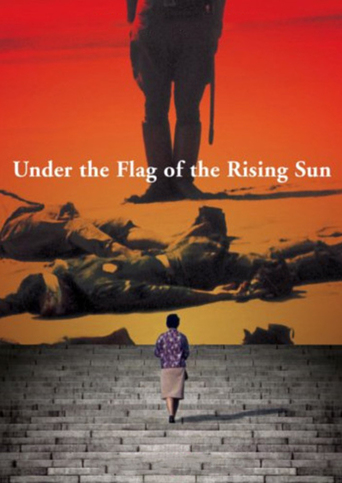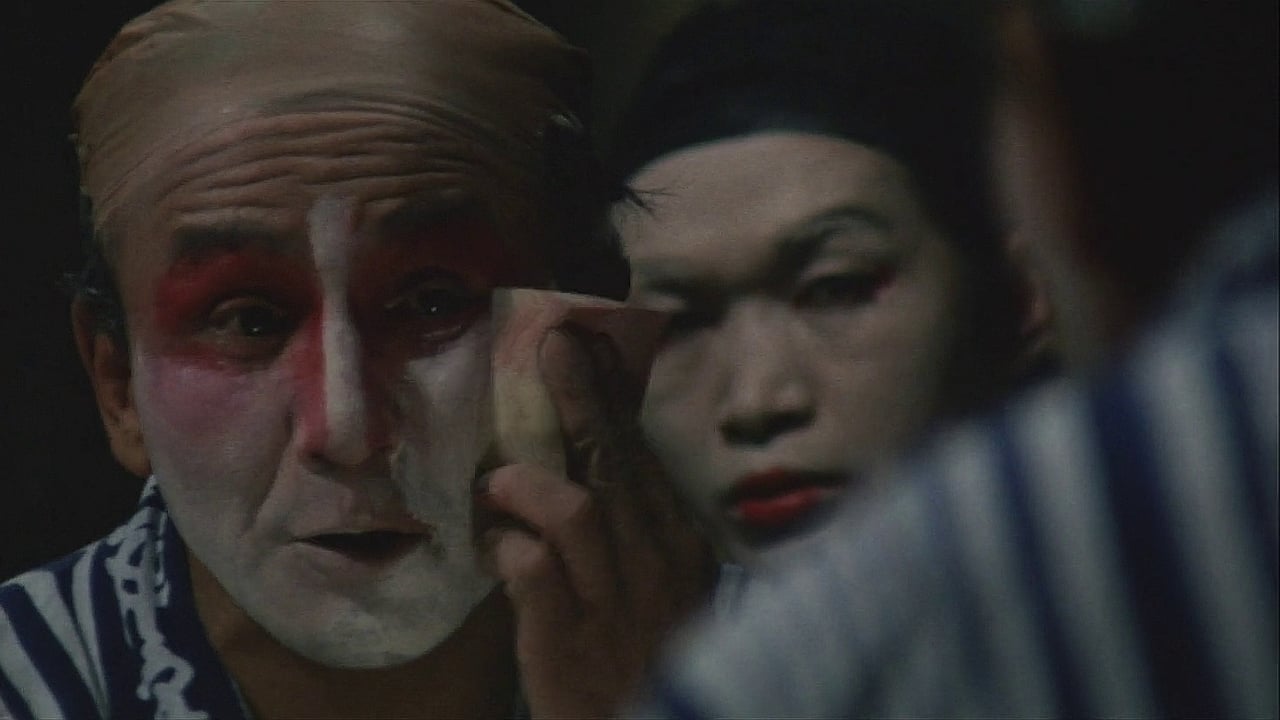mevmijaumau
Under the Flag of the Rising Sun is one of those Japanese movies about WW2 that harshly critique militarism, war atrocities and the mindset of the people involved in it. It was produced independently by Fukasaku and based on the novel by Shoji Yuki, and tells the story of a widow trying to piece together the puzzle of her soldier husband's death on the front.The filming style here is really something to behold. There are many war flashbacks that alternate from color to black and white, normal image to inverted colors, still stock images to live action scenes that often accentuate their shots as still pictures themselves and slow motion scenes of excessive violence among soldiers. Most of this is set to a dramatic orchestral soundtrack, often combined with Dutch angles and Fukasaku's trademark shaky cam. Connecting flashbacks with present time is also common, like in the scene where the retired veteran takes a walk with his granddaughter, and meets two characters, one in the flashback, the other in present time, the change between two times being accompanied by the change from monochrome to color.The acting is very believable and adds to the strong atmosphere of the movie (fun fact - this is the second time actor Noboru Mitani has to play a poor man living in a garbage-filled shanty, the first time is in Dodes'ka-den). Like most post-war Japanese films that tell about the war itself, it's very solemn, dark and with a negative portrayal of, name it, the government, the Emperor, the soldiers, the post-war society refusing to care about the veterans, and of the horrors of war in general.
timmy_501
This is about a woman's quest to find out the truth about her husband Togashi's WWII execution over twenty years after the fact. After spending those twenty years attempting to get answers from bureaucrats, she finally finds some who have some empathy and give her a list of names of people that served with him. She travels to see these people and we see what kind of lives the soldiers returned to. First there's her encounter with a man who lives in what appears to be a mountain of garbage. He tells her that her husband was a great man, a hero who he owes his life to. This man tells her that Togashi wasn't executed at all, that he had to have died in battle. He is unwilling to tell the authorities this story, explaining that he doesn't like to be around people and he hasn't been to a city in years.Naturally she isn't satisfied, part of the reason she wants to find out about her husband's death is to have his name cleared so he'll get the same recognition as other people who died in the war. The next man, a comedic actor who stars in farces about the war, tells her Togashi was executed for stealing a potato from a farmer. The film continues on this way as Togashi's wife gets a different story from every man she encounters. Her journey leads her to people of various social standings including a blind man with an adulterous waitress for a wife, a leftist professor, and a retired public official. Each encounter brings her nearer the truth and gives her a greater understanding of the war experience. She begins to see how terrible it was for all involved and she begins to realize that nobody ever really recovers from it; in other words, a government's recognition of the death of a person it forced to go to war and essentially killed is completely worthless, especially when the government literally executes that person.Fukasaku's film is well plotted and it has a precisely executed theme. Further, the visuals are often impressively delivered. The editing is top notch, particularly in the scenes that suggest the main character's interior state. There's also some impressively handled "new wave" experimental techniques such as still frames and color filters. This film's style called to mind the work of more well known Japanese film-makers of the era such as Nagisa Oshima and Shohei Imamura while still remaining an original, personal work for Fukasaku.
fertilecelluloid
Searing indictment of war and the individuals discredited in its aftermath. Directed by the masterful Kinji Fukasaku, it is a harsh, bleak work that uses monochrome flashbacks with occasional explosions of color, war photographs, and grim narration to tell a terrible tale.Sachiko Hidari, a war widow, has spent twenty-six years searching for the truth about her husband's death. Was he executed? Was he a deserter? Was he a hero? As the government adheres to an official, flawed version of events, the stubborn woman seeks her own answers by speaking to the men who served with her husband. The stories told by these damaged soldiers comprise the bulk of the movie and accounts are complicated by each man's "truth".Exceptionally well acted and directed with a savage determination to depict the insanity of war in its rawest state, this is surely one of Fukasaku's greatest achievements and certainly one of the most honest portraits of homosapien behavior ever branded to celluloid.
squelcho
I'm a fan of Fukasaku's gritty doomed gangster movies, and have come to expect a harrowing exposition of human frailty and self destruction, usually at a very personal level. However, this movie plays out on a much grander scale as it sets about exploring the nature of nationalism, militarism, obedience, subjective reality, repressed memory, and guilt. I'm hard pressed to think of a western movie that digs so deeply into the despair of war widows, or examines their feelings in such minute detail. Technically it's almost a documentary, but personalised by the heroine's relentless quest for the truth. Far from being a glorious affair full of grand heroism and precision munitions, war is a filthy business conducted at the sharp end by people who have little or nothing to gain by it. At the blunt end, the politicians and generals eat well and live a life of whimsical luxury while their forces starve and die brutally in foul conditions. Odd that so few filmmakers choose to explore the madness that sends millions to their death for overweening greed, imperial insanity, or even a bare faced lie. The Blue Max, Dr. Strangelove, and Oh What a Lovely War, amongst others, have examined the glib lunacy inherent in the equation, but Fukasaku's movie is all the more poignant for its protagonist's middle aged ordinariness. If someone tells you that Battle Royale is Fukasaku's finest hour, just ask them if they've seen this movie. It's not "easy" to watch, but it's educational and moving. Try it with rice instead of popcorn.


 AD
AD



